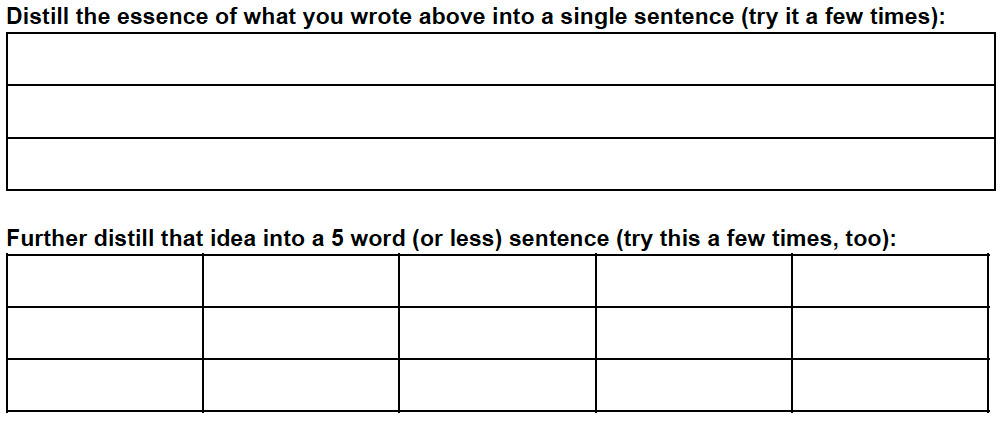
In the process of running a business we spend countless hours dissecting the “what” and “how” of our efforts. What amazing product or service are we going to build? How will we do it? What do our customers want? How do they engage with us? What features should we add this month? How will we tell everyone about it?
Those thoughts and questions can consume years or even decades of our lives. Despite that massive investment, we barely bat an eye at the commitment. We know we have to get stuff done in order to survive. We go, and we do.
But within those busy days and sometimes sleepless nights, how much time do we spend asking why we’re doing any of it at all?
We’re so eager to jump in and solve the problems right in front of us, it’s easy to skip past the bigger, more abstract “why” that’s driving us in the first place.
What is the “Why” Of Your Brand?
That “why” is your core purpose — the fundamental reason your brand exists. As such, it really is worth articulating.
Defining your purpose isn’t just a philosophical exercise. In fact, it serves an incredibly practical purpose. It acts as your guiding star. It’s the idea that focuses every “what” that you do, and every “how” you do it.
It acts as a filter that helps you eliminate things that might lead your company down the wrong path. It helps remind you of what makes you unique in the first place.
Author Jim Collins has spent decades studying and writing about the qualities of historically successful companies (see: Built to Last). One of the common factors he identified with those that had sustained success was an ingrained and well defined purpose.
Similarly, Simon Sinek outlined the relationship between “Why”, “How” and “What” with his Golden Circle diagram. If you haven’t watched his TED talk or read Start With Why, we highly recommend both.

It’s not so hard to get on board with this idea, but it can be pretty challenging to actually write down a statement that accurately reflects your company’s core purpose.
So, what exactly goes into creating a strong Core Purpose statement?
What Your Brand’s Core Purpose Is and Isn’t
Your core purpose — your “Why” — is the fundamental reason your company exists.
It’s not about the specific product or service you offer and it’s also not directly about making money. That’s not to say your current offering or financial goals aren’t important, but those things will change and evolve over time.
Offerings are just routes you take along the journey of your business. There isn’t one singular route that’s guaranteed to work. You’re likely to take many routes during your band’s lifespan.
And the twists and turns of each individual route are unpredictable and can change daily.
Likewise, earning money will provide fuel for whichever route you’re on, but it’s not a destination. As your goals change and routes shift, you may need more fuel — or less. It’s a given that you’ll need fuel no matter your route, but your purpose shouldn’t be simply getting to the next gas station.
Your core purpose is designed to remain constant throughout all of those shifting routes and goals. It’s what keeps you and anyone else you’re working with on the same page and focused.
It allows you to maintain a steady course when your business model breaks down or you decide to make a pivot.
And when things do change, a well defined core purpose helps you decide both what to do and what not to do.
To help you think about your core purpose in this way, here are a few example statements (via Jim Collins) for some well known companies:
- 3M: To solve unsolved problems innovatively
- Telecare: To help people with mental impairments realize their full potential
- Walt Disney: To make people happy
- Mary Kay: To give unlimited opportunity to women
- Patagonia: To be a role model and tool for social change
As you can see, Walt Disney doesn’t mention animation and Patagonia doesn’t talk about awesome jackets. The core purpose for each of these companies exists above any “what” or “how”.
To create a Core Purpose statement for your brand we’ve developed questions and a simple exercise to help you get started.
Discover and Define Your Core Purpose
Here are a few questions to get you thinking about the ingredients for your core purpose:
1. Separate from any financial aspirations, what was the driving force for creating your company? Was it connected to a passion, area of expertise, particular technological / product breakthrough, or simply an emotional drive to create a new path?
2. After that initial spark, describe the journey of founding the company.
3. Since the start what’s changed about the company, and what’s remained constant?
Once you’ve answered those questions, you can complete the exercise:

Additional Thoughts and Guidelines
As you craft and refine your Core Purpose statement, here are some additional guidelines to keep in mind:
- Your Core Purpose should be aspirational, large and abstract. It’s not meant to ever be fully completed.
- It should not include any methods, means, or specific approaches or executions. You should be able to have many different approaches to realizing the Core Purpose without changing the Core Purpose.
- It has to be big enough to be inspiring, but also specific and concrete enough that you can actually work toward it.
- Keep your Core Purpose within your own control. Your Core Purpose shouldn’t be something that depends on actions beyond what you can directly impact. For example: if your product is a new car, you can make the car high quality and make the experience of buying it enjoyable, but you can’t control where people drive the car after they buy it.
Some Free Help to Get Started On Defining Your Core Purpose
If you want some more help defining the direction of your brand, check out our Big Picture Strategy field guide resources to help make sense of your Core Purpose, Vision, Mission, and Core Values. You can also click below to get our free brand strategy workbook with these Core Purpose exercises included. Spend a little time structuring your ideas and you’ll create a clear path for yourself and everyone else on your team.


